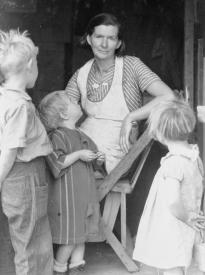Women During The Depression
 An Oklahoma migrant family in California, 1935, by Dorothea Lange. (Library of Congress Prints and Photographs Division)
An Oklahoma migrant family in California, 1935, by Dorothea Lange. (Library of Congress Prints and Photographs Division)
In 1933 Eleanor Roosevelt’s It’s Up to the Women exhorted American women to help pull the country through its current economic crisis, the gravest it had ever faced: “The women know that life must go on and that the needs of life must be met and it is their courage and determination which, time and again, have pulled us through worse crises than the present one.” While women as a group could not end the Depression (mobilization for World War II deserves that credit), the country could never have survived the crisis without women’s contributions.“We didn’t go hungry, but we lived lean.” That expression sums up the experiences of many American families during the 1930s: they avoided stark deprivation but still struggled to get by. The typical woman in the 1930s had a husband who was still employed, although he had probably taken a pay cut to keep his job; if the man lost his job, the family often had enough resources to survive without going on relief or losing all its possessions. Still, Eleanor Roosevelt noted, “Practically every woman, whether she is rich or poor, is facing today a reduction of income.” In 1935–1936 the median family income was $1160, which translated into $20–25 a week to cover all their expenses, including food, shelter, clothing, and perhaps an occasional treat like going to the movies. Women “made do” by substituting their own labor for something that previously had been bought with cash or by practicing petty economies like buying day-old bread or warming several dishes in the oven to save gas. Living so close to the edge, women prayed that no catastrophic accident or illness would swamp their tight budgets. “We had no choice,” remembered one housewife. “We just did what had to be done one day at a time.”
In many ways men and women experienced the Depression differently. Men were socialized to think of themselves as breadwinners; when they lost their jobs or saw their incomes reduced, they felt like failures because they couldn’t take care of their families. Women, on the other hand, saw their roles in the household enhanced as they juggled to make ends meet. Sociologists Robert and Helen Lynd noticed this trend in a study of Muncie, Indiana, published in 1937: “The men, cut adrift from their usual routine, lost much of their sense of time and dawdled helplessly and dully about the streets; while in the homes the women’s world remained largely intact and the round of cooking, housecleaning, and mending became if anything more absorbing.” To put it another way, no housewife lost her job in the Depression.
by Susan Ware
 An Oklahoma migrant family in California, 1935, by Dorothea Lange. (Library of Congress Prints and Photographs Division)
An Oklahoma migrant family in California, 1935, by Dorothea Lange. (Library of Congress Prints and Photographs Division)
No comments:
Post a Comment